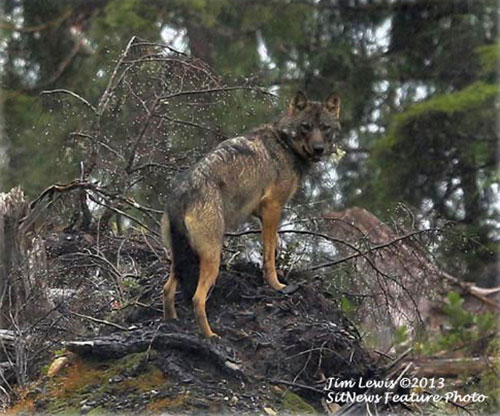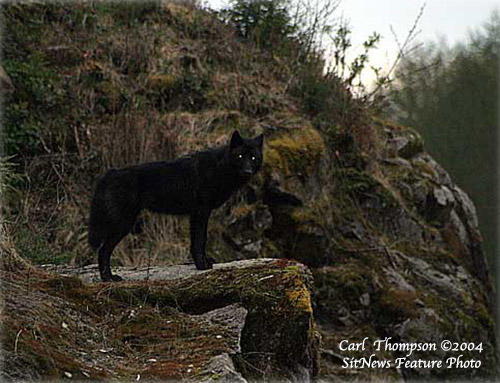
Analysis shows Southeast Alaska wolves aren’t subspecies
December 08, 2014
Monday PM
(SitNews) Ketchikan, Alaska - Professor Matthew Cronin has published a paper in the Journal of Heredity concluding that Southeast Alaska’s wolves are not a separate subspecies.
“My study provides extensive genetic data. That, along with literature published by other scientists, does not support the assertion that these wolves are a subspecies,” University of Alaska Fairbanks' Professor Cronin said.

The Enigma of the Southeast Alaska Wolf
Wolves are mysterious, beautiful and such a rarity to view. In September 2013, six were sighted together north of Ketchikan and a couple looked back briefly before running off, just long enough for a quick photograph.
File photograph by JIM LEWIS ©2013
Cronin said, “This is noteworthy because the wolves in Southeast Alaska are being considered for listing as endangered subspecies. The Alexander Archipelago wolf and the wolves on Prince of Wales Island are currently being considered for listing as endangered by the U.S. Fish and Wildlife Service.”
“There is considerable differentiation of wolves in Southeast Alaska from wolves in other areas,” Cronin said. “However, wolves in Southeast Alaska are not a genetically homogenous group, and there are comparable levels of genetic differentiation among areas within Southeast Alaska and between Southeast Alaska and other geographic areas.”

This wolf was photographed in April 2004 close to North Tongass Highway at approximately 17 miles north of Ketchikan.
File photograph by CARL THOMPSON ©2004
Cronin conducted DNA tests and reviewed published findings on wolf genetics. “They do not support recognition of the wolves in Southeast Alaska as a distinct subspecies,” he said.
The results also show the wolves on Prince of Wales Island are not highly differentiated compared to other populations in Southeast Alaska, which Cronin said indicates they do not warrant recognition as a distinct population segment.
The paper, titled “Single Nucleotide Polymorphism Variation of Wolves in Southeast Alaska and Comparison with Wolves, Dogs and Coyotes in North America,” was written by Cronin and University of California Davis colleagues.
Edited by Mary Kauffman, SitNews
Related News:
Court Decision Stops Four Tongass National Forest Logging Projects - The U.S. District Court in Anchorage issued a decision Friday on what is commonly known as the Islands Wolf lawsuit. Friday's decision has now, for the second time, stopped four Tongass National Forest logging projects. Greenpeace and Cascadia Wildlands have been litigating these projects since 2008. - More...
SitNews - September 27, 2014
Another Lawsuit Takes On Old-growth Big Thorne Logging Project; Suit Follows Scientist's Warning That Alexander Archipelago Wolves Are Threatened - A second lawsuit has been filed to stop the U.S. Forest Service’s Big Thorne timber project on Prince of Wales Island in southeast Alaska. Big Thorne is by far the largest U.S. Forest Service logging project on the Tongass National Forest since the region’s two pulp mills closed about 20 years ago. - More...
SitNews - August 27, 2014
Alexander Archipelago wolf listing as "endangered or threatened may be warranted" says USFWS By MARY KAUFFMAN - The U.S. Fish and Wildlife Service announced that Alaska's Alexander Archipelago wolves may need protection under the Endangered Species Act because of unsustainable logging in the Tongass National Forest and elsewhere in southeast Alaska. The agency will now conduct an in-depth status review of what conservationists call a "rare subspecies" of gray wolf, which lives only in the region's old-growth forests. - More...
SitNews - March 29, 2014
Feds ESA status review for SE Alaska’s Alexander Archipelago wolves 2 years overdue - The Center for Biological Diversity and Greenpeace notified the U.S. Fish and Wildlife Service Tuesday that the Service is two years overdue in deciding whether to initiate an Endangered Species Act status review for southeast Alaska’s Alexander Archipelago wolves. - More...
SitNews - November 13, 2013
On the Web:
Journal of Heredity Science: Single Nucleotide Polymorphism (SNP) Variation of Wolves (Canis lupus) in Southeast Alaska and Comparison with Wolves, Dogs, and Coyotes in North America J Hered first published online November 26, 2014 - Subscription Required
http://jhered.oxfordjournals.org/content/early/
2014/11/25/jhered.esu075.full.pdf+html
Abstract is Free - Journal of Heredity Science: Single Nucleotide Polymorphism (SNP) Variation of Wolves (Canis lupus) in Southeast Alaska and Comparison with Wolves, Dogs, and Coyotes in North America J Hered first published online November 26, 2014
http://jhered.oxfordjournals.org/content/early/2014/11/25/jhered.esu075.abstract
Source of News:
UAF’s School of Natural Resources and Extension.
Matthew Cronin is a research professor in the Palmer office of UAF’s School of Natural Resources and Extension.
www.uaf.edu
Publish A Letter in SitNews
Contact the Editor
SitNews ©2014
Stories In The News
Ketchikan, Alaska
|
Articles &
photographs that appear in SitNews may be protected by copyright
and may not be reprinted without written permission from and
payment of any required fees to the proper sources.
E-mail your news &
photos to editor@sitnews.us
Photographers choosing to submit photographs for publication to SitNews are in doing so granting their permission for publication and for archiving. SitNews does not sell photographs. All requests for purchasing a photograph will be emailed to the photographer.
|
|


